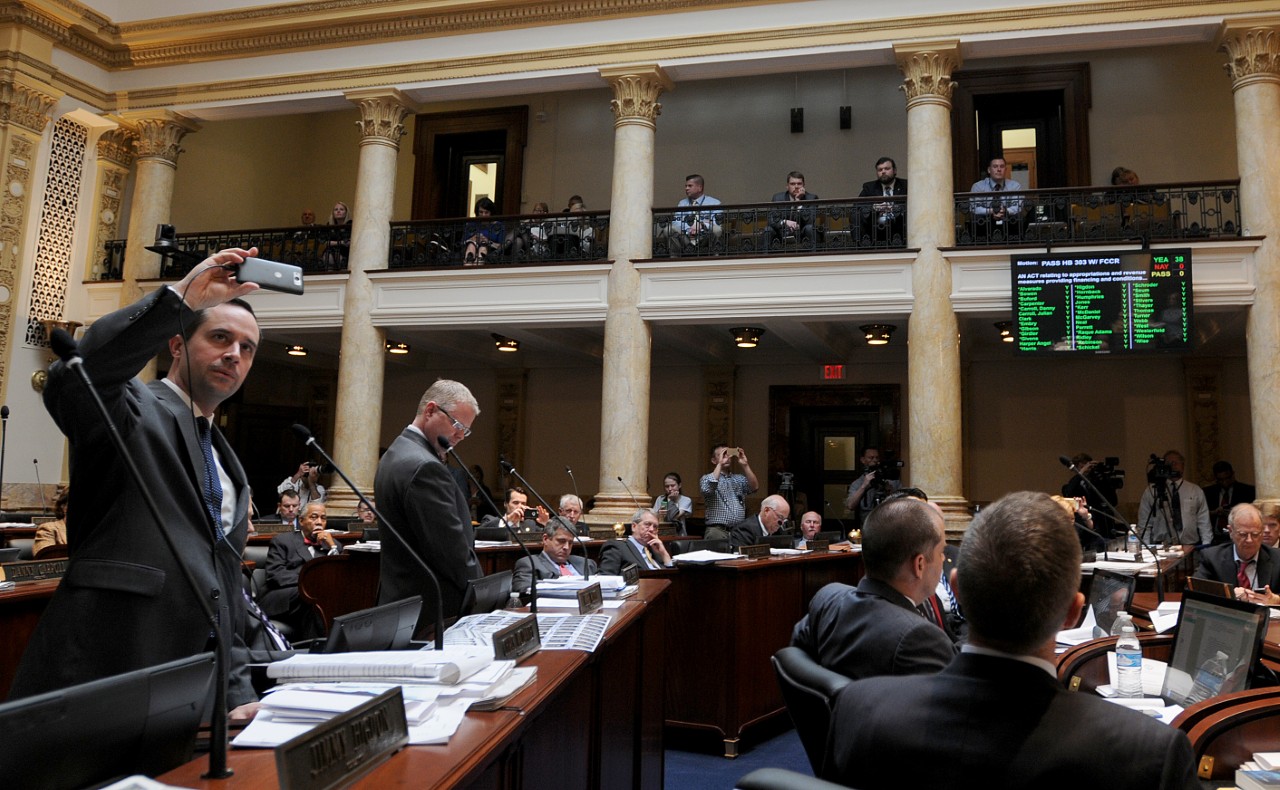The Kentucky General Assembly has passed a $21 billion Executive Branch budget for the next two fiscal years that will pour $1.28 billion into the state pension systems and make no cuts to K-12 education while authorizing the governor’s plan to cut most state agency funding by nine percent over the biennium.
Lesser cuts were authorized by the spending plan, found in House Bill 303, to Kentucky’s constitutional offices including the Secretary of State’s Office, Office of Attorney General, State Treasurer’s Office, and the Auditor of Public Accounts along with a few other agencies including the Department of Agriculture and the Board of Elections. No cuts will be made to the Department of Veterans’ Affairs under HB 303.
The House gave final passage to HB 303 by a vote of 98-1. House Appropriations and Revenue Committee Chairman Rick Rand, D-Bedford, said the measure is a “bipartisan, agreed-upon” Executive Branch spending plan and explained its provisions before the final vote.
The lone no vote was cast by Rep. Jim Wayne, D-Louisville.
Before the state Senate passed HB 303 by a 38-0 vote earlier in the evening, Senate Appropriations and Revenue Committee Chairman Christian McDaniel talked about how the spending plan came about.

“This is the result of a very intense conference committee that has met over the last several weeks,” said McDaniel, R-Taylor Mill. “As we’ve talked throughout the course, the budget is the ultimate policy document of any agency. To that end, this reflects the policy beliefs of both ends of this chamber.”
Gov. Matt Bevin issued the following statement on the budget passage:
“The citizens of Kentucky appreciate the hard work that was put into this bipartisan budget agreement. I personally thank Senate President Stivers, House Speaker Stumbo and the members of the General Assembly for ensuring that we keep our commitment to state employees, teachers and retirees. I am proud to say that we have invested more in our state pensions than ever before. This was the right and necessary thing to do.

“Everyone came together bringing different viewpoints to the table. The result is that we have a budget that is going to put Kentucky on solid financial footing. It is conservative, focuses on important current priorities and also saves for the future. This budget sends a strong signal to the financial and business communities that we take our financial obligations seriously. I look forward to reviewing the details of the final bill over the coming days and signing a fiscally responsible budget into law.”
Most new money in HB 303 will go for state pension in the Kentucky Employees Retirement System and the Kentucky Teachers’ Retirement System. Additionally, HB 303 includes an over $100 million bond for workforce development requested by the Bevin and includes a multi-million dollar “permanent fund” requested by the governor, although not as large a fund as he had hoped—the budget sets aside $125 million for the fund while the governor requested $500 million.
That money will come from a surplus in the Kentucky public employee health insurance trust fund.
Funding for K-12 education will not be cut under HB 303, which protects funding to schools and gives the Department of Education up to $20 million in additional funds over the biennium as a necessary governmental expense if there are not enough per-pupil SEEK funds available.
Public preschool will be made available to families with incomes below 200 percent of the poverty level as part of a pilot program, and $15 million in preschool funding will be set aside for grants to help develop full-day programs for children eligible for state child care assistance.
In the area of higher education, HB 303 authorizes lesser cuts of 4.5 percent over the biennium for state colleges and universities that faced the possibility of 9 percent cuts under the governor’s original proposal. A performance-based funding formula for state universities is also found in the bill that will require 5 percent of state university base funding to be gauged on an institution’s performance.
Kentucky State University would be exempt from the performance-based model.

As for scholarships, HB 303 authorizes more than $25 million to provide eligible recent Kentucky high school grads up to two years’ free tuition at public and private colleges and universities that offer associate degree programs. The scholarships will be awarded beginning this fall as part of the Kentucky Work Ready Scholarship Program created by HB 626, which received final passage in the House tonight by a vote of 90-9.
Additionally, the bill supports higher education by including $10 million over the biennium for the Coal County College Completion Scholarship Program.
Lawmakers reached the compromise that led to passage of HB 303 during the Governor’s veto recess.
The Governor vetoed six bills during the recess including the session’s revenue bill, or HB 423, and parts of the Judicial Branch budget found in HB 306. The Judicial Branch budget veto removed two mandated expenditures from the over $800 billion budget bill that total around $25.5 million, including $23.5 million in fund transfers to the state’s General Fund.
The Governor explained the veto of the fund transfers by saying the transfers “go beyond the limit of what the Commonwealth should require from the Judicial Branch,” which was already slated to receive cuts of nine percent over the next biennium with the final passage of HB 306.
Rand said HB 303 will restore funding for the Judicial Branch to the level requested by Kentucky Chief Justice John D. Minton.
The veto of HB 423 led lawmakers to move most of the tax credits and other contents of that revenue bill, which is used to balance the state budget, into HB 80, a measure that originally dealt with open records. HB 80 received final passage in the House by a vote of 88-10.
Kentucky Legislative Research Commission
* * * * * * * * *
Northern Kentucky University
NKU President Geoffrey Mearns sent the following message to the university community Friday regarding the budget:
The across-the-board cut to the public universities remains at a 4.5% reduction to our respective base appropriations. I am very pleased, though, that our elected officials have begun addressing the funding disparity that has long existed for NKU. Specifically, the General Assembly has agreed to increase our state appropriation by $5.3M in the second year of the biennium. In addition, state leaders have made a commitment to adopt an outcomes-based funding model to be developed by a task force in the coming months.
I am grateful for the support and advocacy from the faculty, staff, and students of our University. In January, I asked you to “make them hear you,” and you certainly did. I am also appreciative of our local legislators and community partners, who fought for fair funding for our University. I am proud of the way that our entire community came together to take a stand for NKU and our region.
Our University continues to face financial challenges. But today we take a step forward together.
He added that he will be making a presentation on the budget at 9 a.m. Monday in the Student Union Ballroom.


















